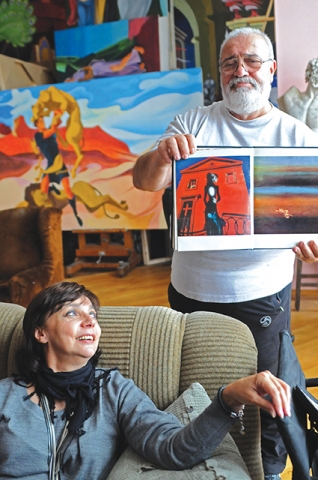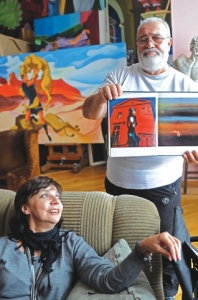Meet Temo Gotsadze, Painter & Former Gallery Director
As part of a continued collaboration between BI Auction and GEORGIA TODAY to bring readers a series of interviews with famous Georgian painters, in this issue our guest is Temo Gotsadze, famous Georgian painter and former director of the National Art Gallery whose works are kept in museums and galleries both in Georgia and abroad, including in France, Germany, Russia, USA, Great Britain, Turkey, Italy, Mexico, and Canada.
What influenced you to become a painter?
Temo Gotsadze: It probably started in my early childhood. My school teacher… It wasn’t a painting class, but the stories she told us and the information I absorbed kind of influenced me and formed me. My father also painted very well, although he was a surgeon- initially he was an anatomic pathologist, but when he returned home from World War II he began working as a surgeon. He even wrote a medical thesis and illustrated it with his own drawings of the human anatomy. I remember staying at home as a kid, drawing images of village life or something else, a little like a game with unfinished images as hints given, from which I had to make a story in painting. It was how, unconsciously, I learned how to make a composition. In the middle of the 50s, a new generation of Georgian artists entered the scene. I was in sixth or seventh grade then, when a different aesthetics in the art of painting emerged, with different colors, themes. Social-realism was fading away. As my school teacher often said, we had to have an eye on everything; try to remember every single detail and reproduce it afterwards, so I often went to museums memorized the paintings and made copies back home. When Galaktion Tabidze (famous Georgian poet) died, I went to the memorial service held in the Writer’s House and made a number of sketches, childish impressions of course, but I remember it very clearly as some starting point…
Why do you think the 1950s and 60s saw Georgian art thriving?
It was a new generation of artists, coming after the Second World War, trying to rediscover themselves; searching for the base on which Georgian genetics, traditions, thoughts and values were grounded, not only in painting but also in literature. They had something new to say. It’s a continuous process… I’m sure in 10-20 years another generation of artists will come along to change the situation, building it on the existing experience and on the things the previous generations created.
Is the creative process itself like an impulse for you, or is it more of a brewing, preparing, storing?
Studying at the Tbilisi Academy of Art was a time of learning and absorbing… I guess it sort of accumulated in me over the six years I was there. When I graduated, my first painting was Blue Stallions (one of his most famous artworks) and off it went all through my career. Sometimes you work every day, routinely, for several hours, or just make sketches to continue on another day; there are times when you feel you need an impulse which can come from anything- you may fall in love and it’ll be your inspiration to create, just as I had with Marina (Marina Janashia, his spouse, famous Georgian actress.) You never know or can’t guess when exactly that inspiration will come… I try to remember my impressions, to fix them through notes, because you can’t of course bring all of them into color instantly, and when I look through my notes it brings a spark… I always did that, fixating the associations that came to me.
Have you changed as an artist?
I think I changed three times through my career. I had a period that can be called naïve, at the beginning, then came a more professional one with large paintings, followed by contemporary abstractions… Now, I’m having a break and I feel like I have to find out what I’ll be working on next, as I don’t want to repeat what I’ve already done.
In one of your interviews, you say you love paradoxes and finding beauty in ugly things…
I think that creativity and art in general are an individual’s pursuit of beauty, it has to be the reason, otherwise it makes no sense.
What would you recommend young artists who’re just about to start?
I would suggest they rebel, as it will help them find their way, their niche, their own style…
Nino Gugunishvili











